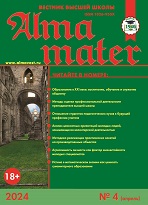https://doi.org/10.20339/AM.06-18.061
N.V. Tarinova is senior lecturer at Perm State Humanitarian Pedagogical University e-mail: tarinovanv@mail.ru
Presented is description of combination of different types of organization of educational activity (contact training, tutor maintenance, couching form of education, correspondence training) by correspondence course, and also described are pedagogical conditions for experimental and analytical training of correspondence students under conditions of remote form of education with the aim of formation of pedagogical competence. Features of the process of training in pedagogics as humanitarian science are fully considered under conditioned of technological form of remote education, specific of which discussed in technological component, pedagogical component, and in organizational component.
Key words: experimental and analytical training, pedagogical conditions, pedagogical competence, coaching and tutoring maintenance, remote form of education.
References
- Andreev, V.I. Pedagogics: Educational course for creative self-development. Kazan, 2000.
- Kosolapova, L.A. Experimental and analytical training in pedagogics: conceptual model. Russian scientific magazine. 2011, no. 2 (21), pp. 98–107.
- Kosolapova, L.A. Methodological reference points of designing of pedagogics as subject matter in the conditions of transition to federal state educational standards. In: Realization of ideas of developing training in educational process at school and higher education institution. Petrozavodsk, 2011, pp. 210–214.
- Kosolapova, L.A. Experimental and analytical training of students in pedagogics. Izhevsk, 2010.
- Ovsyannikov, V.I. Correspondence and remote training: twins or antipodes? Open education. 2002, no. 2, pp. 64–74.
- Pedagogical encyclopedic dictionary. Moscow, 2002.
- Polat, E.S. Distance learning: organizational and pedagogical aspects. Moscow, 2005.
- Polat, E.S. The problem of determining effectiveness of distance learning. Open education. 2005, no. 3, pp. 71–77.
- Psychology and pedagogy. Moscow, 1998.
- Tarinova, N.V. Conditions of improvement of quality of teaching pedagogics to students to correspondence students: experimental and analytical model and possibilities of distance learning. Vestnik of Orel state university. 2012, no. 8, pp. 258–262.
- Philosophical encyclopaedic dictionary. Moscow, 1989.











.png)






